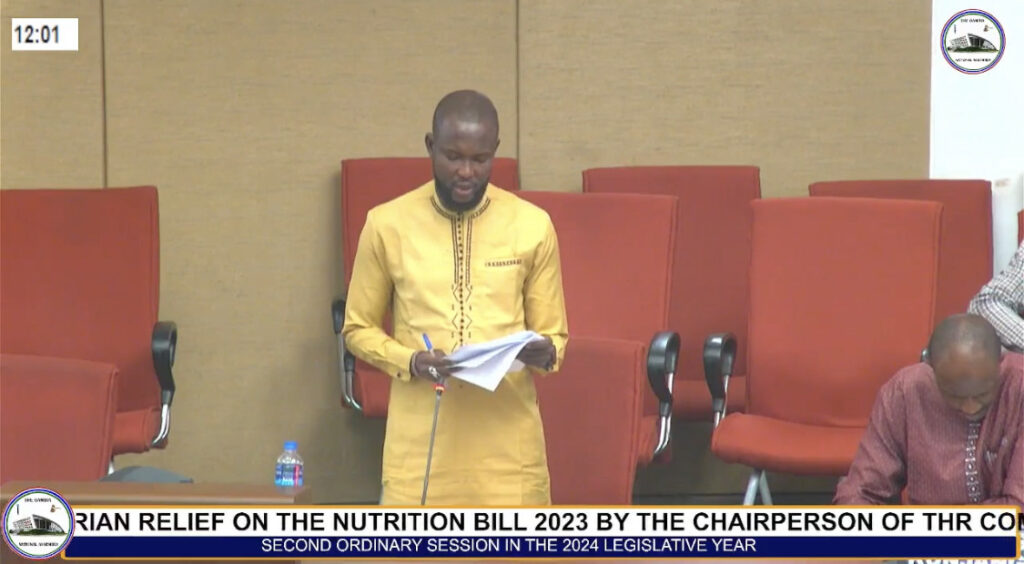
Hon. Modou Lamin Bah, The Vice Chairman Of NA Select Committee On Health
By Ramatoulie Jawo
The National Assembly members adopted the report of the National Assembly select committee on Health, Children, Refugees, and Humanitarian Relief regarding the Nutrition Bill, 2023, during their session on Thursday.
The Nutrition Bill, 2023 was initially presented to lawmakers on March 4th, 2024, during the First Ordinary Session of the 2024 Legislative term by His Excellency Vice President Muhammad BS. Jallow.
During the second reading of the Bill, Honourable Members deliberated on its fundamental merits and principles. Subsequently, the Bill underwent a second reading and was referred to the Assembly Business Committee for assignment to the relevant Committee or Committees, as per Standing Order 68.
Following this, the Bill was directed to the Select Committee on Health, Disaster, Humanitarian Relief, and Refugees by the Assembly Business Committee.
The Committee’s mandate included a comprehensive review of the Nutrition Bill, 2023, culminating in the presentation of their findings and recommendations.
In presenting the committee’s report to lawmakers, Vice Chairman Hon. Modou Lamin Bah highlighted the rigorous review process undertaken. He emphasized that each clause of the National Nutrition Bill, 2023 was meticulously examined, drawing upon expert opinions and consultations with relevant stakeholders to ensure a well-informed assessment.
“The Committee relied on the testimonies of witnesses and the position papers to review the details of the whole Bill, clause by clause, taking due notice of any input aimed at adding value to the content of the Bill. Cross-references were made to ensure that the content of the Bill was brought in conformity with the 1997 Constitution of the Republic of The Gambia and other laws of the country,” he said.
Regarding the appointment of a coordinator and facilitator, Hon. Bah emphasized that the National Nutrition Agency would serve as the Secretariat for the National Alliance for Food Fortification.
“The Executive Director of the National Nutrition Agency shall appoint amongst the Agency Staff a Coordinator and Facilitator for the National Alliance for Food Fortification. The National Alliance for Food Fortification may invite other individuals of recognised academic, scientific, or technical competence to assist the Alliance in carrying out its functions. Such individuals shall be entitled to remuneration that the Alliance members may have,” he added.
He outlined the functions of the National Alliance for Food Fortification, which include coordinating and supporting food fortification and bio-fortification programs, advocating for political commitment from all stakeholders, and mobilizing resources for implementing these activities.
Regarding the Nutrition Bill of 2023, it comprises ten parts and forty-nine clauses. The bill aims to uphold Gambians’ rights concerning food and nutrition security, aligning with the country’s constitution and international agreements. It proposes measures such as ensuring adequate nutritional services, enhancing stakeholder coordination, establishing governance structures, and reviewing relevant legislation. The bill underscores the timely implementation of policy objectives to enhance public well-being.
During their discussion, members highlighted the significance of good nutrition and commended the committee for its diligent work.
Following deliberations, the members unanimously endorsed the report of the select committee on Health, Children, Refugees, and Humanitarian Relief on the Nutrition Bill of 2023.
